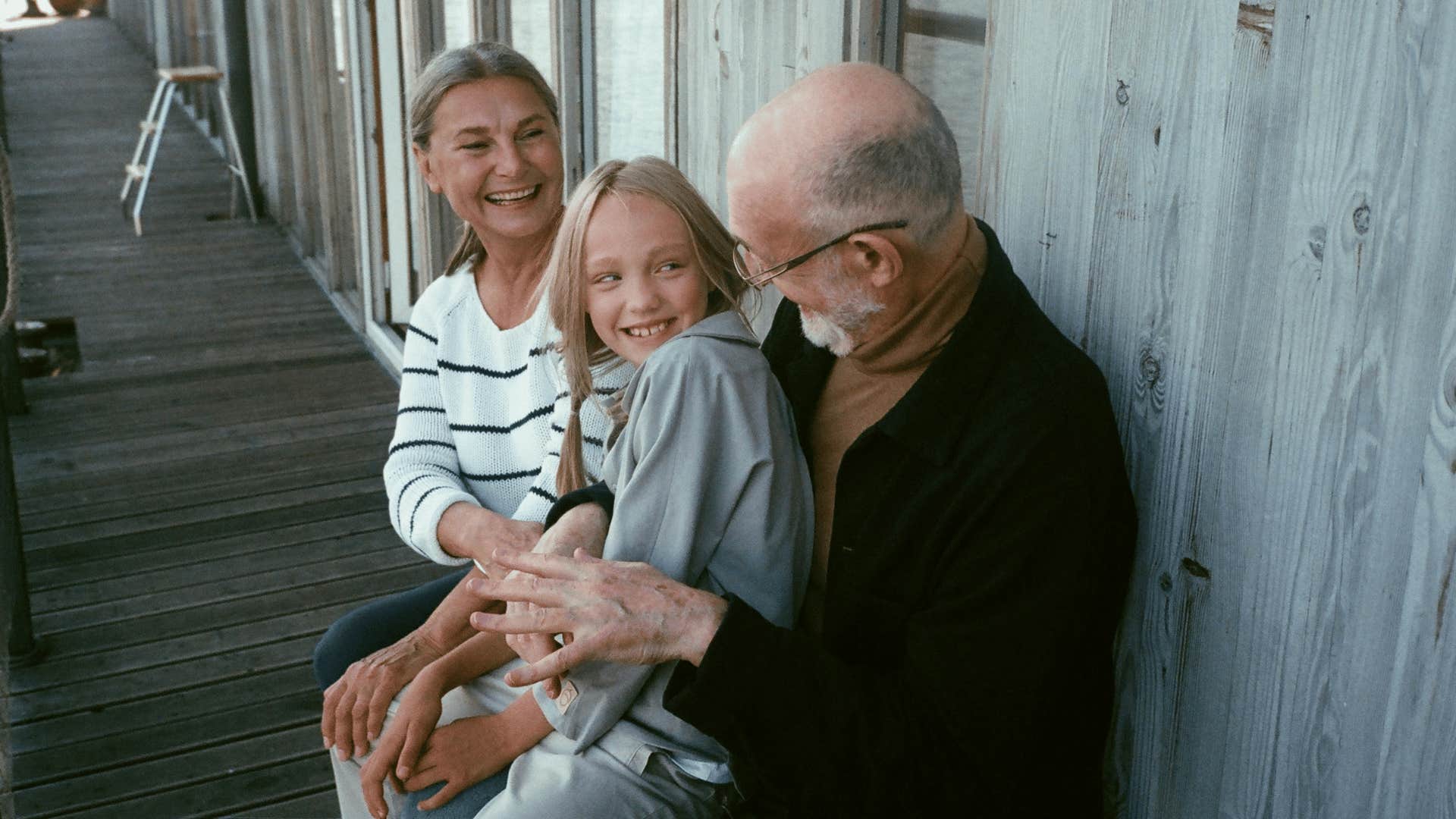12 Signs You Grew Up In A Toxic Family, Even If You Were Told It Was Normal
It's hard trying to live a normal life when you grew up in chaos.
 Derick Santos | Canva
Derick Santos | Canva For people who grew up in dysfunctional families, life can be difficult in ways that “normal” others don’t understand. If your partner grew up in a more average or functional family, then s/he likely doesn’t know why you say or do certain things or DON’T say or do them. And you may always feel like you just don’t fit in.
Note: This post covers kids from all types of dysfunctional families, from chaotic alcoholic families to wealthy and high-functioning, emotionally neglectful ones. Not every point will resonate with everyone, but some will speak to you if you have had a difficult upbringing.
Here are 12 signs you grew up in a toxic family, even if you were told it was normal:
1. You struggle with the concept of 'normal'
 Cast of Thousands | Shutterstock
Cast of Thousands | Shutterstock
There is a book written for Adult Children of Alcoholics (and it will resonate with adult children of any type of dysfunctional family), called Adult Child’s Guide To What’s Normal. This goes through many specific questions that kids who were raised in dysfunctional families have no idea about, like how to say no to plans, or what time is considered too late for a visit.
When you grow up in a very dysfunctional family, you have no idea what other people do, and if other people’s families resemble the families you see on TV or not (answer: they kind of do, sadly for those who were raised in far, far different scenarios).
2. You struggle to rely on family members
 Antonio Guillem | Shutterstock
Antonio Guillem | Shutterstock
For adult children of dysfunctional families (which I’ll abbreviate ACDF), it is very strange to hear other people say things like, “I want my mom there when I give birth” or “I’m annoyed that my dad left after only a couple hours of helping me move.”
For people who rely only on themselves, and possibly friends/spouses, it can be mindblowing to hear about how other people’s parents help with housework, childcare, finances, and, most distressingly, provide emotional support. This is not the world of the ACDF, which has learned not to expect any support, although they may often provide support of this nature to parents.
A peer-reviewed chapter from The Impact of Dysfunctional Families on the Mental Health of Children states that ACDF is likely to present with weakened health, psychological trauma, and behavioral problems because of insufficient emotional support, affection, care, and love from both parents. As a result, children struggle to trust and rely on their parents as they develop a sense of fear for their environment. Lack of trust hampers family relations.
3. You struggle with understanding what a good parent is
 Matilda Wormwood | Pexels
Matilda Wormwood | Pexels
For ACDF who grew up being ignored, neglected, or verbally/physically abused, having kids can be terrifying. There is no way to overstate the truth that ACDF has no automatic default when it comes to parenting.
Other people may say things like, “I just think, what would my mom do?” This is 180 degrees away from how the ACDF operates; s/he is always thinking, “If my mom would do it, I better do the opposite.”
Many women (mostly women, because in our culture, women are expected to innately be “good with kids,” which is tough for women who had no healthy maternal role model) devour parenting book after parenting book, hoping to figure out how to talk to and behave with their children in functional ways.
Sometimes, when you observe very stilted but well-intentioned interactions between parents and kids, like parents who ask about the child’s feelings about every minor event and then extensively validate them, you are witnessing the courageous efforts of people with zero frames of reference for positive parenting, who are nevertheless trying valiantly to raise happy and healthy children.
Abuse and neglect affect the child’s ability to trust the world, others, and themselves. Additionally, they grow up without a frame of reference for what is expected and healthy. They may develop traits they struggle with throughout their adult lives, with many effects.
As adults, they face difficulty forming professional, social, and romantic bonds and are viewed as submissive, controlling, overwhelming, or even detached in relationships, as researchers from Arabian Gulf University found. Perhaps most seriously, these individuals continue the cycle by developing their parenting problems and reinforcing the dysfunctional dynamic.
4. You struggle with relying on your child's grandparents
 cottonbro studio | Pexels
cottonbro studio | Pexels
It can be very painful for the ACDF to see pictures on social media of friends with their parents and their kids, captioned, “Three generations!” or the like.
The idea of leaving your kids in your parents’ care for even a couple of hours is frightening for many ACDF, even if in actuality their parents have become more stable or calm over the years and nothing terrible would befall their children. Just the idea of your parent potentially yelling at or neglecting your child is a major trigger and fear for the ACDF.
But while some unloved adult children can figure out how to keep their families of origin involved in their own kids’ lives—most usually when there is a geographical distance between the two households—I am sorry to say that horror stories abound. Peg Streep, author of Daughter Detox: Recovering from an Unloving Mother and Reclaiming Your Life, shares an interview from her book:
“When my oldest boy was 10 or so, he balked at going for a summer visit because he said, ‘Grandma makes us fight, and I don’t like it,’ so he went to a friend’s house, and I brought it up with my mother who told me I was indulging a weakling... Fast-forward to the next Christmas when my brother’s kids got expensive dirt bikes and jackets, and my kids got tee shirts. She made a point of saying this was what happened to children who disrespect their elders. My boys were crushed and angry, and, for me, the straw broke the camel’s back. It wasn’t good for my kids or me.”
5. You struggle with career and financial instability
 Andrea Piacquadio | Pexels
Andrea Piacquadio | Pexels
For some kids who grew up in chaotic families, with job loss and financial instability, no adults may have had the time, inclination, or ability to provide any input on potential education opportunities or career paths for an adolescent.
Rather than having parents who try to cultivate a child’s talents and strengths, the parents of the ACDF are often struggling to survive. They have no clear career path or financial goals themselves, so it is hard for them to pass on any words of wisdom even if they want to.
Often, they advise their kids to get a job right out of high school as they distrust higher education and college loans, and the adult children, particularly if they are interested in academics, may always regret this decision.
Other children grow up and make a lot of money, but feel unfulfilled because they know in their hearts that their career isn’t a good fit for their strengths… yet, they are still unclear on what else would be a better option.
6. You struggle with healthy romantic relationships
 Shift Drive | Shutterstock
Shift Drive | Shutterstock
For people who saw distant, emotionally shut down, or, conversely, histrionic and violent relationships between their parents (or parents with other people), it can be almost impossible to figure out what a healthy relationship or marriage should look like.
Often, ACDF is addicted to the idea of romance and fairy tale endings, and they figure out the ins and outs of dating from TV or watching other people.
However, when the honeymoon stage ends, ACDF is often at a loss for how to maintain a healthy relationship in the absence of tremendous and overwhelming passion and early-stage romantic drama.
They may resort to dysfunctional behaviors they saw at home, like withdrawing from partners, verbally abusing them, or cheating on them, to keep their partners interested, or even just because they have no other template in their minds of how to behave in a long-term relationship.
A 2021 study from the Journal of Adult Development found that dysfunction in the family of origin influenced the belief that finding enduring love is possible. Positive lay beliefs, in turn, negatively predicted dysfunction in the current romantic relationship, and romantic dysfunction negatively predicted romantic relationship satisfaction.
The significant indirect effects confirmed that lay beliefs were an essential mediator of the effect of past dysfunction on present dysfunction and of the impact of past dysfunction on present relationship satisfaction.
7. You struggle with appropriate boundaries
 fizkes | Shutterstock
fizkes | Shutterstock
For ACDF, it can be very hard to know what healthy boundaries are, either for oneself or for others. When a friend says she has to get off the phone, the ACDF may fear that the friend hates her. When a husband has to work late, the ACDF may start scouring his computer for evidence that he is cheating. In many dysfunctional families, there is no privacy, either physical or emotional.
Parents enter rooms without knocking, they say anything on their minds even if it’s inappropriate for kids to hear, and kids may witness things that should be done in private. Later in life, the ACDF has no idea what should be kept private, and what should be shared.
A 2011 study found that a central assumption of family systems theory is that interdependencies among relationships within the family are governed by boundaries or implicit rules for accessing materials, resources, and support within the family. Guided by the concept of boundaries, family systems theorists have consistently identified three qualitatively distinct profiles of family interactions characterized by harmony, disengagement, and enmeshment, respectively.
In contrast, disengaged families have rigid boundaries, manifested in cold, indifferent, unsupportive, and emotionally withdrawn family relationships. Communication across family subsystems is stymied and complicated, and family members function as distinct entities rather than as part of a unified whole.
8. You struggle to manage money
 Nicola Barts | Pexels
Nicola Barts | Pexels
In homes where money was diverted to substance use, gambling, or other dysfunctional uses, parents are often unable to pay rent or bills on time. The kids learn nothing about how to save money for a rainy day, or even for ongoing expected bills.
As adults, they can struggle mightily with managing their own money, and even when they get their first well-paying job, they may still live paycheck to paycheck.
9. You struggle to keep a clean house
 cottonbro studio | Pexels
cottonbro studio | Pexels
Kids from many different types of dysfunctional families, like those where there is hoarding, substance abuse, social anxiety, depression, and more, never learn how to keep a home in a clean and welcoming condition.
This is because there are never any visitors, and without anyone coming into the house, it progressively deteriorates, and parents who are struggling with their own major issues often have no energy or desire to clean it up.
ACDF can either become compulsively clean and neat or struggle with encroaching mess and chaos in their own homes. Either way, they are frequently secretly very worried about how their home looks to outsiders.
Sometimes, if they have enough money, they will rely on a cadre of experts, like interior decorators, housekeepers, and the like, to keep their home looking “normal.” Even when they are told their home is beautiful by other people, they don’t believe it deep down, or they think that they will eventually be found out as an imposter.
10. You struggle with self-care
 JLco Julia Amaral | Shutterstock
JLco Julia Amaral | Shutterstock
ACDF frequently struggle with eating healthy, exercising, and prioritizing their own needs or health in any way. They go years between the dentist or doctor’s appointments, even if they have the financial resources to go more regularly.
This is because, if these needs are neglected by one’s parents in childhood, the child never really gets into the mindset of caring for these needs even in adulthood. ACDF parents may be assiduous about monitoring their own children’s health, hygiene, and exercise while neglecting their own to a surprising degree.
11. What struggle with a healthy body image
 Tatyana Dzemileva | Shutterstock
Tatyana Dzemileva | Shutterstock
Children whose bodies were not well loved in childhood, either via criticism, not being fed or cared for, or being abused, have great difficulty loving their bodies in adulthood.
This can extend to not feeling any desire as well. Children whose parents had eating disorders were exposed to self-hatred in their parents and likely learned to model this behavior from a very young age. When ACDF goes into a dressing room with a friend, and the friend is happy about how she looks in outfit after outfit, this can be shocking to the ACDF, who has never felt acceptable-looking in anything.
12. You struggle with telling people about your childhood
 Marcelo Chagas | Pexels
Marcelo Chagas | Pexels
This is a key question that plagues ACDF who want to grow closer to friends or intimate partners. They want to share some of what has happened to them, but they were frequently instructed in childhood, “Don’t tell anyone what goes on in this house” either directly or indirectly.
They want emotional support from others, but they fear that others won’t understand or will be disgusted or mocking. This leaves the ACDF very lonely and isolated, even amid people who would genuinely want to learn more and who would be understanding and compassionate.
If this article resonates with you, try to work on answering #12 first. Shame that is not expressed never goes away. If it is too scary to confide in a trusted friend or partner, you can always find a therapist, who can listen and support you through processing your feelings about your childhood, as well as help you to move forward in a more free and confident way.
If you need a springboard into a conversation with your partner, you can use this post to spark a discussion about things that you may have previously glossed over when describing your upbringing and its impact on your life now.
Dr. Samantha Rodman Whiten, aka Dr. Psych Mom, is a clinical psychologist in private practice and the founder of DrPsychMom. She works with adults and couples in her group practice Best Life Behavioral Health.
